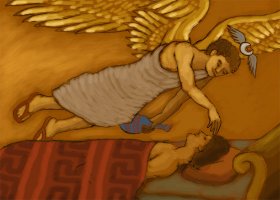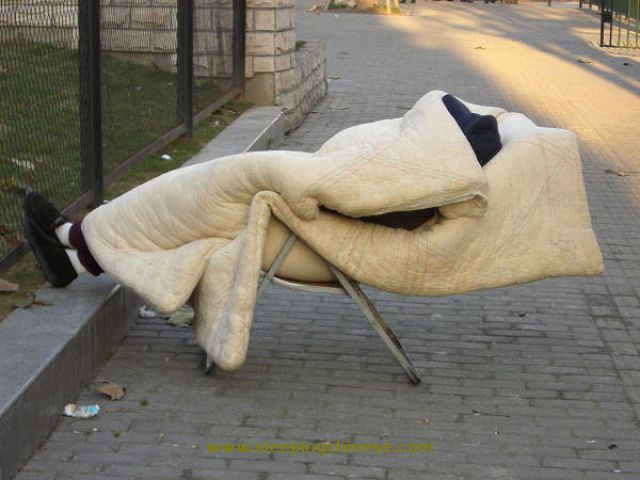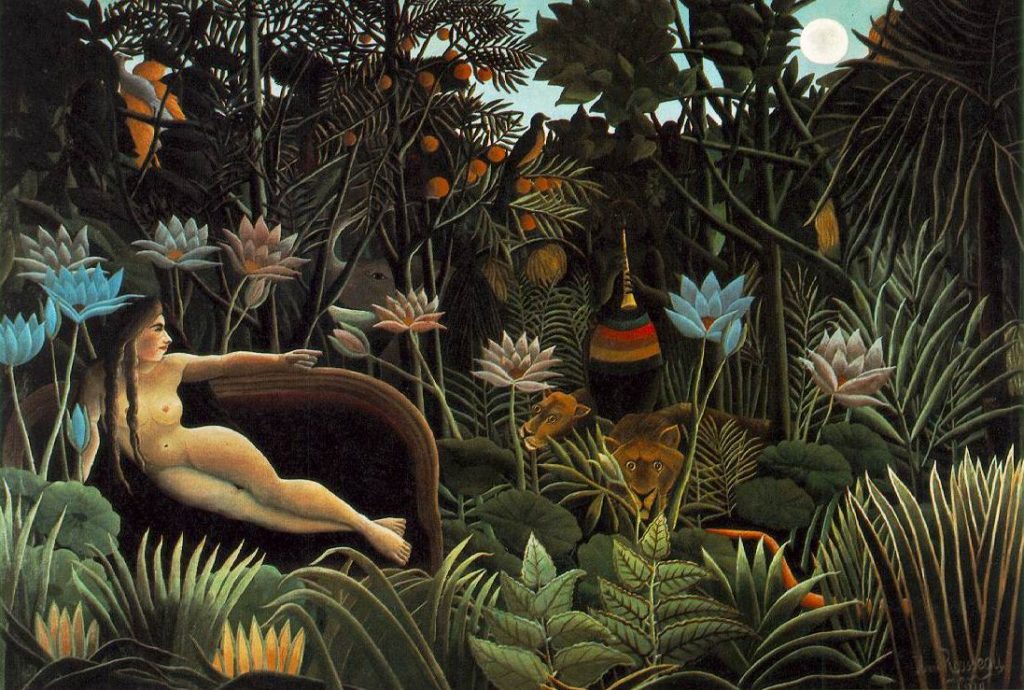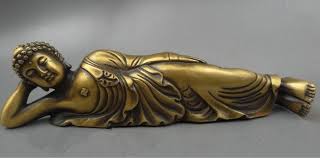
(reading time 5-7 min. – with tips and a Qi Gong exercise)
Sleep is a strange phenomenon. We can all sleep, although we were never taught to. Like food and sexuality, sleep is an instinctual basic human need. We spend a third of our lives in this state.

That the ancient Greeks were already fascinated by sleep is evidenced by the fact that sleep was personified in Greek mythology by Hypnos. Hypnos is the son of Erebus (the Darkness) and Nyx (the Night) and twin brother of Thanatos (the Death). His sons were the famous Oneiroi, who were responsible for human dreams.
In Chinese medicine, sleep is mainly the game of Yin and Yang, of the Heart and the Blood. When the Heart is calm and the Blood is abundant, the body and Mind (Chinese: Shen) can relax and sleep will be deep and revitalizing. The night is the domain of the Yin, of rest, relaxation, coolness, and of the dark . At night the Yin embraces the Yang, the activity of the day rests in the nourishing arms of the night. During the night, the body and mind recover from physical exertion and psychological tension, the blood is purified, hormones for numerous bodily functions and processes are produced, in short, during a good sleep the battery is recharged for the next period of activity. In other words: the Yin creates the conditions for the Yang. There is something natural about sleep. After all, it seems normal to fall asleep and then wake up refreshed. At least until there comes a moment for many people when they can no longer take sleep for granted: suddenly at night you suddenly spend hours staring at the ceiling or wake up often, sleep restlessly, wake up early or are plagued by intense dreams that they wake up exhausted in the morning.
The Chinese say Yin and Yang are opposites, they feed each other, merge into each other and keep each other in balance. For Yin and Yang you can also read night and day.

In our current society, we sometimes seem to forget that day and night are closely connected. There is a great emphasis on action, on doing, on undertaking, performing, always being ‘online’. The Yang, dynamic aspect of our existence is much appreciated and often affects the Yin. For example, a typical contemporary syndrome such as a burnout is often caused by the Yang that has literally burned up the Yin. With regard to sleep, it means that an overactive Yang ensures that body and mind cannot relax and sleep problems arise. The Yin can no longer embrace the Yang, so that the Spirit remains restless and people find it more difficult to fall asleep, wake up often, have violent dreams, sleep restlessly and wake up unrested. Another possibility is that there is too little Yang, often in combination with emotional complaints, so that people are tired but cannot sleep or sleep very superficially.
Poor sleep can also have other causes such as jet lag, change in the weather, sleep hygiene (eg too hot or cold bedroom, too much coffee, alcohol, etc.) or because of asthma, pain or itching. Sleeping problems also often occur in the case of stress and depressive complaints, whereby the emotional complaints worsen the sleeping problems, which in turn causes a worsening of the emotional complaints. In these cases, sleep will improve if the other conditions are treated or modified successfully as well. In practice, these complaints are often addressed at the same time because they are often caused by the same imbalance from Chinese medicine.
As in Western medicine, in Chinese medicine insomnia is a symptom, not a disease. Insomnia is a signal of an underlying imbalance between Yin and Yang. So we look for what causes the imbalance between Yin and Yang. Just as a detective searches for the perpetrator, the therapist searches for the pathogenic factor or, as it is called in Chinese, the Xie Qi, the bad or sickening Qi.
There are essentially 3 types of pathogenic factors in Chinese medicine. There may be an external pathogenic factor. That is a climatic factor that attacks the exterior of the body and causes complaints, such as external Wind, Heat, Cold and Vapor. An internal pathogenic factor disrupts the internal dynamics of the organism, with emotions as the main pathogens and a third category includes pathogenic factors that do not belong to the external or internal pathogenic factors, such as e.g. radiation, a poor diet or, in the case of sleep, sleep hygiene.
At De Witte Os you can count on a personal approach to solve sleeping problems
During an intake interview, we go deeper into the nature of the complaints and a few additional diagnostic questions are asked. In combination with the pulse diagnosis and tongue diagnosis, the therapist gets a good picture of the current situation and a personal treatment plan is drawn up. The best result is achieved by coming to the practice for a few weeks in a row for an acupuncture treatment in combination with Tui Na massage therapy.
Are you curious about what acupuncture can do for you? Then make an appointment for an intake interview.
Fortunately, not all sleep complaints are difficult to solve and advice on sleep hygiene can sometimes already give a significant improvement in sleep quality.

The Taoist physician Ge Hong (3rd century AD) suggested a number of exercises to treat insomnia. I don’t want to withhold this series of Qi Gong exercises:
1) Lie on your back, with your knees bent. Use the hands on the knees to move toward the chest, breathe normally. Stay with your knees on your chest for 1 minute. Then straighten the arms and legs and place them at the sides of the body.
2) Still lying on your back, extend the arms above your head as you inhale. On the exhale, bring your hands down and massage the chest and abdomen. Then relax the arms and place them at the sides of the body. Do this 5x.
3) Still in the same position, make fists of your hands and place them, each on 1 side of the spine, as high as possible along the spine towards the shoulders. Take 3 deep breaths and move the fists down a bit. You do this up to the lower back, where you take 5 deep breaths. Then place the fists along the tailbone and take another 5 deep breaths.
4) Lie on your stomach and place the hands under your stomach. Breathe in and out slowly and pause after each breath. Relax all muscles and release all mental and emotional tensions. Repeat this several times.
5) The sleeping position: The Taoist Deer sleeping position, which is very similar to the Lion pose from Buddhism. Lie on your right side and bend the right arm at the elbow, palm up at face level. The left arm rests on the side of the body, with the elbow on the left hip, so that the hand dangles in front of the abdomen. The right leg is straight, while the left knee is bent and rests on the bed in front of the right hip.

Curious about what acupuncture and Tui Na massage therapy can do for you? Then make an appointment for an intake interview.